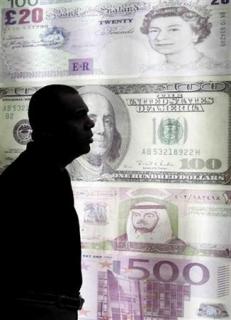Latest NEWS
- Aswat Masriya, the last word
- Roundup of Egypt's press headlines on March 15, 2017
- Roundup of Egypt's press headlines on March 14, 2017
- Former Egyptian President Hosni Mubarak to be released: lawyer
- Roundup of Egypt's press headlines on March 13, 2017
- Egypt's capital set to grow by half a million in 2017
- Egypt's wheat reserves to double with start of harvest -supply min
- Roundup of Egypt's press headlines on March 12, 2017
Egypt debt insurance cost at record, more currency fall seen

A man walks past a currency exchange office in Cairo - Reuters/Mohamed AbdelGhany
LONDON, July 1 (Reuters) - The cost of insuring Egyptian debt against default surged to record highs on Monday after a night of politically-inspired violence that saw eight people killed and the ruling Muslim Brotherhood's headquarter set on fire.
Forward contracts indicated a significant fall for the country's pound currency against the dollar after millions protested nationally over the weekend, calling for President Mohamed Mursi's resignation.
They were the biggest protests since January 2011, during the last days of the Hosni Mubarak regime. Egypt's economy has been slipping steadily into outright crisis in the political chaos that has followed.
Five-year credit default swaps rose 34 basis points to record highs of 900 bps, according to pricing agency Markit. They have leapt 200 bps since mid-June, and currently indicate a cost of $900,000 per year to insure $10 million worth of debt for a five-year period.
A CDS price at 1,000 bps typically indicates distressed debt.
Fears for the country's political and economic future have deepened, with investment drying up, inflation rising and fuel shortages. Many analysts say that fresh elections are unlikely to bring much relief.
"If I were an investor and see what's happening on the street, I wouldn't want to put any money there," said Souheir Asba, emerging markets strategist at Societe Generale.
"If they were to start all over again, there would be much less faith in post-Mubarak Egypt because they will have tried democracy and failed."
The central bank stepped in with a new system of currency auctions in December of last year after the pound sank to record lows and a black market developed to fill gaps in dollar supplies.
The bank has since managed a steady 10 percent slide of the currency, bringing losses since this time last year to around 15 percent and making it harder for Egyptians to buy staple imported goods like oil and food.
One-year non-deliverable forwards have moved sharply higher in the past week, to 8.85 on Monday, implying a depreciation of more than 21 percent in the coming year, from the current spot exchange rate of around 7 per dollar.
At the beginning of last week, one-year NDFs - calculated by assuming the currency will depreciate or appreciate by an amount equivalent to the currency's deposit rate over that period - traded at 8.33.
"From a valuation perspective, the pound has room to depreciate much more," Asba said. "This is not rock bottom."
Cairo's stock market was shut for a market holiday, but stocks hit a two-week closing high on Sunday. (Reporting by Sujata Rao and Carolyn Cohn; editing by Patrick Graham)










